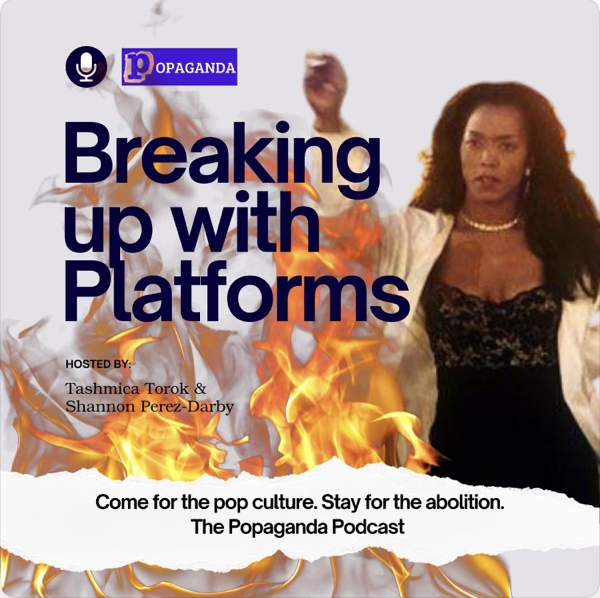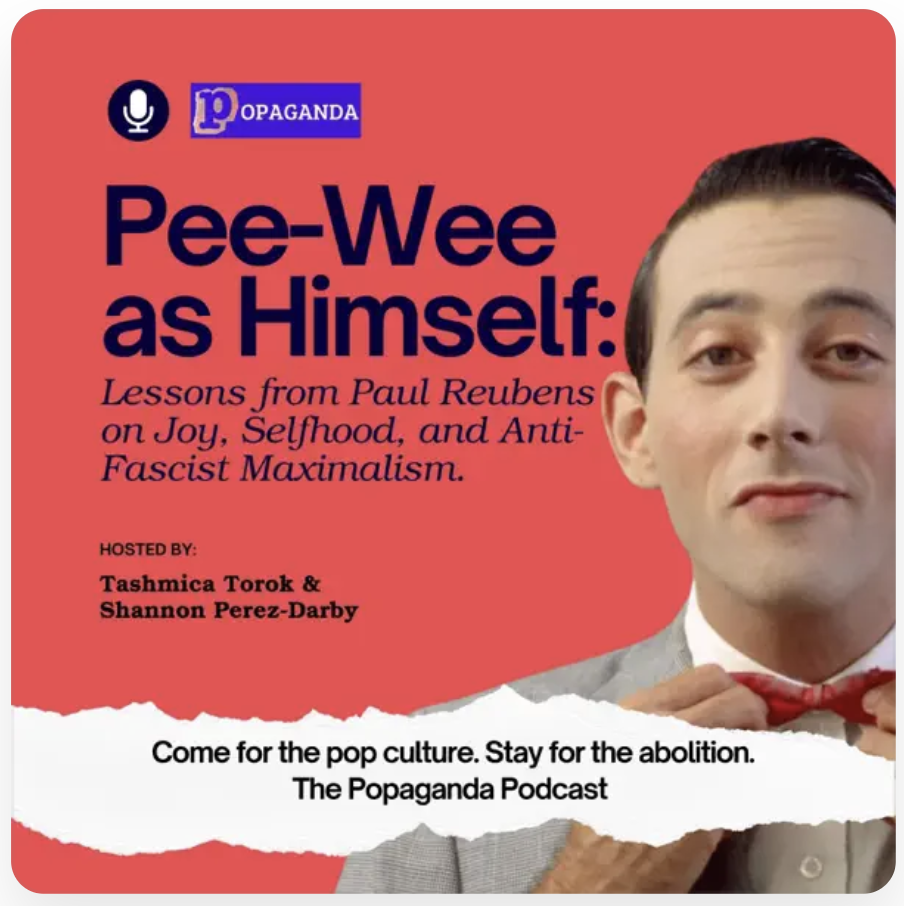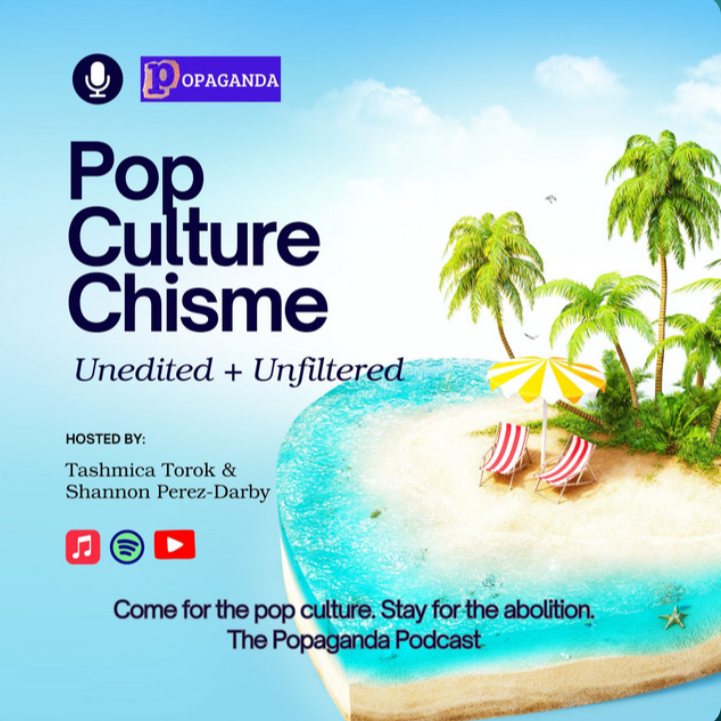Popaganda can be found anywhere you listen to podcasts
breaking up with platforms: Boycotts, billionaires and fascist creeps
What happens when your comfort shows stop comforting—and your “fun little apps” start feeling like tiny extensions of state power?
In this episode, Shannon Perez-Darby and Tashmica Torok talk about how living under fascism is reshaping our relationship to pop culture, streaming, and the platforms we’ve treated like default companions. From canceling Hulu/Disney after the Jimmy Kimmel controversy (and the bigger question of what a boycott is actually asking for), to rethinking Spotify amid reports of ICE recruitment ads, we share what we’re wrestling with: values vs. convenience, visibility vs. safety, and how to stop “overstaying” in unhealthy relationships.
We also get real about grief (yes, even for a 20-year relationship with Grey’s Anatomy), the algorithmic slide into right-wing propaganda and diet-culture-as-evangelism, and why our nervous systems are demanding different kinds of stories right now—like audiobooks, games, and community-centered ways of staying connected that don’t depend on billionaire-owned platforms.
Are you in your breakup era, too? Then put on your softest sweatpants, order some takeout, and come on over for a lonely hearts club episode of The Popaganda Podcast.
Pop Culture Homework:
Listen: Dungeon Crawler Carl (audiobook)
Watch: No Other Land and support Masafer Yatta.
Reflect: What platform or subscription are you “overstaying” with—and what would a clean, loving exit look like?
Sponsored in part by: Accountable Communities Consortium
Access: Transcript now available on Apple Podcasts
Credits:
Executive Producers: Shannon Perez-Darby and Tashmica Torok
Audio Production: Shannon Perez-Darby
Show Notes + Graphic Design: Tashmica Torok
DIE hard: copaganda final boss
Is Die Hard a Christmas movie? In Tashmica’s house, absolutely—and it’s also a masterclass in copaganda.
In this special holiday episode, Shannon and Tashmica rewatch Die Hard the way Tashmica’s family does every year: loud, talk-back style, like a Christmas Rocky Horror—except the call-and-response is all about how the “good cop” story gets built.
We break down how the film makes John McLane (Bruce Willis) irresistible—young, tender, “just a guy trying to get his family back”-while quietly selling us a whole worldview: cops can bend rules, instincts count as evidence, police violence is redemption, and everyone else (dispatch, LAPD, FBI, the “system”) is incompetent until the right cop takes charge.
Along the way, we unpack: why the “terrorists” being white matters, how the Black characters are positioned (from “Black nerd” to “cop who needs his gun back”), why the ham-radio emergency line moment is peak “rules don’t apply to cops,” and how even the Christmas sparkle (hello, “Ho Ho Ho, now I have a machine gun too”) is part of the package.
Welcome to the holiday copaganda workshop you didn’t ask for - but probably need. Yippee-ki-yay, motherfucker!
Pop Culture Homework:
Watch: Die Hard (1988)
Read: The Fence: A Police Cover-up Along Boston’s Racial Divide – the book Tashmica mentions on police culture + the “blue wall” logic*
Reflect/Discuss: What’s the ‘cop intuition’ moment in your favorite cop show/movie—and what does it train us to excuse?
*Correction corner: Michael Cox, the focus of the book The Fence, was brutally beaten, but he survived the attack and the cover-up that followed.
Sponsored in part by: Accountable Communities Consortium
Access: Transcript now available on Apple Podcasts
Credits:
Executive Producers: Shannon Perez-Darby and Tashmica Torok
Audio Production: Shannon Perez-Darby
Show Notes + Graphic Design: Tashmica Torok
Wayward
What if our best tool for fighting fascism is embracing all of our ‘Wayward’ teens and their imagination for resistance?
In this episode, Shannon and Tashmica rave about the talented nonbinary artist Mae Martin (they/them), and Wayward, the limited series they created for Netflix. Set in 2003, the story follows Leila and Abby, teenage best friends and a local police officer, Alex, as they uncover dark secrets surrounding the town and their strange relationship with a local academy for troubled teens.
Martin’s portrayal of Alex (he/him), a trans man, and his relationship with his pregnant wife Lauren, delivered a captivating story that normalized the existence of trans people and queer family dynamics while also giving us one of the hottest queer sex scenes we’ve ever seen on a mainstream platform.
Listen in as we talk cultish spiritual vibes, that time Republicans crashed Grindr, and the all too real impact of the for-profit, unregulated Troubled Teen Industry (TTI).
Welcome to Tall Pines. We think you’ll like it here.
Pop Culture Homework:
Watch: Wayward
Read: Officials calling for state investigations over use of force in East Lansing, Michigan
Listen: The Autobiography of Assata Shakur, Pen and Paper: Library of A Pan African Communist | Podcast on Spotify
Sponsored in part by: Accountable Communities Consortium
Access: Transcript now available on Apple Podcasts
Credits:
Executive Producers: Shannon Perez-Darby and Tashmica Torok
Audio Production: Shannon Perez-Darby
Show Notes + Graphic Design: Tashmica Torok
Pee-Wee as Himself
Fascism trains us to shrink. Pee-wee shows another path: bold, maximal, unashamed. What can Paul Reubens teach us about refusing to comply in advance?
In this episode, hosts Shannon Perez-Darby and Tashmica Torok discuss the pressure to get small under rising Fascism—and how Paul Reubens, through Pee-wee Herman, modeled color, camp, and audacity anyway. From 70s/80s performance-art roots to TV fame, we trace what it means when a persona eclipses a person, how moral panic + policing criminalize marginalized people, and why maximalist self-expression is not a luxury but a practice of selfhood as resistance.
Pop Culture Homework:
Watch: Pee-wee as Himself (HBO), dir. Matt Wolf.
Sponsored in part by: Accountable Communities Consortium
Access: Transcript now available on Apple Podcasts
Credits:
Executive Producers: Shannon Perez-Darby and Tashmica Torok
Audio Production: Shannon Perez-Darby
Show Notes + Graphic Design: Tashmica Torok
we are lady parts
This week on Papaganda, Shannon and Tashmica dive into We Are Lady Parts, the brilliant British sitcom about an all-Muslim punk band that has captured hearts with its humor, complexity, and radical tenderness. From awkward first gigs to the band’s unapologetic “villain era,” we explore themes of friendship, family, self-determination, and joy in claiming your full personhood.
As this episode comes out, it marks the year anniversary of the passing of Shannon’s dear friend and beloved community member Alix 'Ponyboy' Kolar. Ponyboy was a deep lover of pop culture, so many of Shannon’s fondest memories are sitting on the couch watching TV with Alix. Ponyboy loved We Are Lady Parts, so in his loving memory, with all the laughter and joy, we dedicate this episode to you, Alix 'Ponyboy' Kolar.
Make sure you stay until the end of the episode for a sweet dedication to the one and only Ponyboy. Thank you to Lisa Nims for letting us share your beautiful words. There was no one quite like you Ponyboy, we miss you. We love you.
Sponsored in part by: Accountable Communities Consortium
Access: Transcript now available on Apple Podcasts
Credits:
Executive Producers: Shannon Perez-Darby and Tashmica Torok
Audio Production: Shannon Perez-Darby
Show Notes + Graphic Design: Tashmica Torok
pop culture chisme 2025
What if you could sit in on our group chat—unedited, unfiltered, and supported by a quick check-in with Daddy Google? In our 2nd annual Pop Culture Chisme episode, we unpack the messiness of reality TV, the chokehold The Pit had on us, and the power of Alex Cooper naming abuse in sports.
This time, we edit nothing—no cuts, lots of “ums,” and even more chisme. You’ll feel like you’re sitting in on a late-night text chain, jumping from how Love Island USA disaster crash-outs say more about race and gender than romance to the tragedy of diluted queer representation in And Just Like That. We get nostalgic over ER via The Pit, and add Alex Cooper’s Call Her Alex documentary to each other’s pop culture homework.
No one gets our complex relationship with Couples Therapy and our favorite TV therapist, Orna Guralnik more than Marina & Micah from Couplet Comedy.
Join us as we celebrate 5,000 downloads! What started as a fun experiment for two pop culture besties has become the space we dreamed of—where TV, movies, and headlines open the door to deeper conversations about Transformative Justice, abolition, care, and the world we’re building together.
This Week’s Pop Culture Homework
How to End Family Policing, coauthored by our own, Shannon Perez-Darby, and Erin Miles Cloud, Erica R. Meiners and Charity Tolliver!
Grounded in the work of over 20 contributors, How to End Family Policing: From Outrage to Action lays out a vision for alternatives to family policing. From leading abolitionist organizers, this book is a much-needed intervention arguing that the systems that purport to protect children make them-and our communities-less safe.
Offered by Haymarket Books. Pre-Order now! http:bit.ly/endfamilypolicing
Sponsored in part by: Accountable Communities Consortium
Access: Transcript now available on Apple Podcasts
Credits:
Executive Producers: Shannon Perez-Darby and Tashmica Torok
Audio Production: Shannon Perez-Darby
Show Notes + Graphic Design: Tashmica Torok
Sinners: Black History, Biracial Hauntings, and the Horrors of White Supremacy Culture
What do you get when you mix juke joint resistance, supernatural horror, and a masterclass in Black storytelling? Sinners—Ryan Coogler’s 2025 genre-defying masterpiece—sets the Mississippi Delta on fire, and The Propaganda Podcast is here for that Smoke (and Stack).
In this episode, co-hosts Shannon Perez-Darby and Tashmica Torok sink their teeth into the historical brilliance, Black cultural references, and intergenerational reckoning that make Sinners a film for the ages. From Michael B. Jordan’s dual-role performance to Wunmi Mosaku’s heartbreakingly embodied magic, we explore themes of vampire lore as white supremacy, biracial identity, cultural reclamation, ancestor hunger, and radical resistance—plus some very hot sex scenes.
Whether it’s Grace's Molotov rage, Mary’s weak link behavior, or a juke joint dance sequence that turns into a spiritual time-travel portal—this film is layered, lush, and full of rabbit holes that will have us jumping for a long time into the future.
This Week’s Pop Culture Homework
Watch Sinners! Now streaming on Max.
The ‘Sinners’ Movie Syllabus by Jemar Tisby & Keisha N. Blain
Sponsored in part by: Accountable Communities Consortium
Access: Transcript now available on Apple Podcasts
Credits:
Executive Producers: Shannon Perez-Darby and Tashmica Torok
Audio Production: Shannon Perez-Darby
Show Notes + Graphic Design: Tashmica Torok
Adolescence
Adolescence isn’t your typical TV crime drama. Stephen Graham, creator and writer of the hit Netflix miniseries, isn’t asking you to figure out who did it—he’s asking you to consider why.
Shot entirely in one continuous take, each episode of this four-part series follows 13-year-old Jamie, a boy accused of murdering a classmate. But Jamie isn’t just a perpetrator. He’s also a child—shaped by patriarchy, misogyny, and unexamined rage.
In this episode, hosts Shannon Perez-Darby and Tashmica Torok examine the layered dynamics of Jamie’s story—from his family and peers to the criminal legal system and the court-appointed therapist tasked with assessing him. Together, they explore violence, gender, punishment, and how a child becomes capable of such devastating harm.
From incel culture and manosphere influence to the realities of digital parenting, we ask: If children can be radicalized into hate, can they also be guided back into healing? What does accountability look like when the person who caused harm is still developing? And who do we become when we let the carceral system answer those questions for us?
"There's a wonderful saying, which is, it takes a village to raise a child. And within that kind of complexity ... it's kind of like, maybe we're all accountable.”
– Stephen Graham, Adolescence Creator & Writer
This Week’s Pop Culture Homework
Watch Adolescence on Netflix
Read Black Pill by Elle Reeve
Sponsored in part by: Accountable Communities Consortium
Access: Transcript now available on Apple Podcasts
Credits:
Executive Producers: Shannon Perez-Darby and Tashmica Torok
Audio Production: Shannon Perez-Darby
Show Notes + Graphic Design: Tashmica Torok
CCFF x Popaganda Presents: Firebreak
The Popaganda Podcast is an official Cast & Crew Sponsor of the 15th Annual Capital City Film Fest.
Join cohosts Shannon Perez-Darby and Tashmica Torok in an episode spotlighting the Midwest premiere and Closing Night Feature Firebreak, a deeply moving documentary screening.
Firebreak follows Brandon and Royal, two formerly incarcerated firefighters who turned exploitation into transformation—and built a nonprofit, the Forestry and Fire Recruitment Program, to help others like them access careers in wildland firefighting.
💥 What We Talk About in This Episode:
Prison labor, fire camps, and the myth of redemptive suffering
Reentry, shame, and the trap of gratitude narratives
Ancestral land connection and environmental justice
Daredevil, fiddle-faddle, and why background checks aren’t liberation
That gorgeous mural scene (bring tissues)
Nonprofit hustle, funder fatigue, and the fight for sustainability
Jacket envy. Obviously.
This Week’s Pop Culture Homework
Sponsored in part by: Accountable Communities Consortium
Access: Transcript now available on Apple Podcasts
Credits:
Executive Producers: Shannon Perez-Darby and Tashmica Torok
Audio Production: Shannon Perez-Darby
Show Notes + Graphic Design: Tashmica Torok
King of the Apocalypse
Dakota Adams and the Cost of Extremism.
This episode unpacks King of the Apocalypse, a new documentary exposing Stuart Rhodes, founder of the Oath Keepers and key figure in the January 6th insurrection. But this isn’t his story—it’s about the people who survived him.
Through the eyes of Dakota Adams, we explore how radicalization and abuse shaped the family Rhodes tormented, the years of planning that went into their escape, and the systemic failures that left them unprotected.
Now, Stuart Rhodes is free. Pardoned. No parole. No restrictions. Back in public life, standing behind Trump at rallies. What does this mean for his family? For the rest of us?
Join hosts Shannon Perez-Darby and Tashmica Torok as they examine the intersections of white supremacy, domestic violence, and rising authoritarianism. Listen in as they break down why militia movements thrive in unchecked power, what Dakota’s escape reveals about survivor resilience, and why we must take the growing far-right threat seriously.
Pop Culture Homework:
Sponsored in part by: Accountable Communities Consortium
Access: Transcript now available on Apple Podcasts
Credits:
Executive Producers: Shannon Perez-Darby and Tashmica Torok
Audio Production: Shannon Perez-Darby
Show Notes + Graphic Design: Tashmica Torok
Neil Gaiman:
Power, Control, & Consent
What do Neil Gaiman, Scientology, and NDAs have in common? More than you'd think—and none of it is good.
Join hosts Shannon Perez-Darby and Tashmica Torok as they break down the accounts of harm, the power imbalances, and the larger cultural problem with how we talk (or don’t talk) about consent. Listen in as they unpack why we need better ways to talk about sexual violence—because the binary of "totally consensual" or "definitely rape" just doesn’t cut it.
They also get into:
Why we struggle to ask for what we want in relationships.
The difference between "sexy hitting" and just... hitting.
Consent practices we can learn from BDSM.
Neil Gaiman’s deep ties to Scientology (because of course).
The weirdness of trying to buy your way out of accountability.
If you've ever side-eyed a dude who says he's a feminist but also just happens to have a long history of dating barely legal women, or if you've ever wondered what happens when you mix cult-like obedience structures with unchecked power... well, this one's for you.
This Week’s Pop Culture Homework
This episode of The Popaganda Podcast is inspired by the podcast Master: The Allegations Against Neil Gaiman.
Sponsored in part by: Accountable Communities Consortium
Access: Transcript now available on Apple Podcasts
Credits:
Executive Producers: Shannon Perez-Darby and Tashmica Torok
Audio Production: Shannon Perez-Darby
Show Notes + Graphic Design: Tashmica Torok
Anatomy of Lies
On this episode of The Popaganda Podcast, Tashmica and Shannon talk about the explosive new psychodrama series, Anatomy of Lies, which uncovers the jaw-dropping story of Elisabeth Finch, a Grey’s Anatomy writer who fabricated her life story, exploited the empathy of her colleagues, and used the trauma of others for personal gain. Stories like Finch’s weaponize trust and harm the very communities they pretend to support, creating ripple effects that extend far beyond Hollywood.
But the conversation doesn’t stop there. Using Finch’s story as a starting point, we tackle a deeper, systemic issue: the persistent devaluation of survivor stories in our society. Survivors are the architects of the movements that fight sexual and domestic violence, yet their courage, labor, and wisdom are too often dismissed—whether in the workplace, the media, or at the ballot box. We confront the grief of watching a nation re-elect a known perpetrator of harm and discuss the hard truths about what that says about our collective values.
Listen in as we uncover:
The harm caused when stories like Finch’s co-opt the experiences of survivors.
Why survivor stories are foundational to the movement against violence—and why they deserve our respect.
How society’s dismissal of survivor voices contributes to larger systems of harm, including our political landscape.
What it means to face hard truths, hold grief, and still fight for a better future.
This episode is a heartfelt call to action: to honor survivors, to trust their stories, and to build a culture that values truth and justice over harm and exploitation.
Pop Culture Homework:
Watch Anatomy of Lies and reflect on its implications for how survivor stories are treated in media, workplaces, and our larger culture.
Sponsored in part by: Accountable Communities Consortium
Access: Transcript now available on Apple Podcasts
Credits:
Executive Producers: Shannon Perez-Darby and Tashmica Torok
Audio Production: Shannon Perez-Darby
Show Notes + Graphic Design: Tashmica Torok









